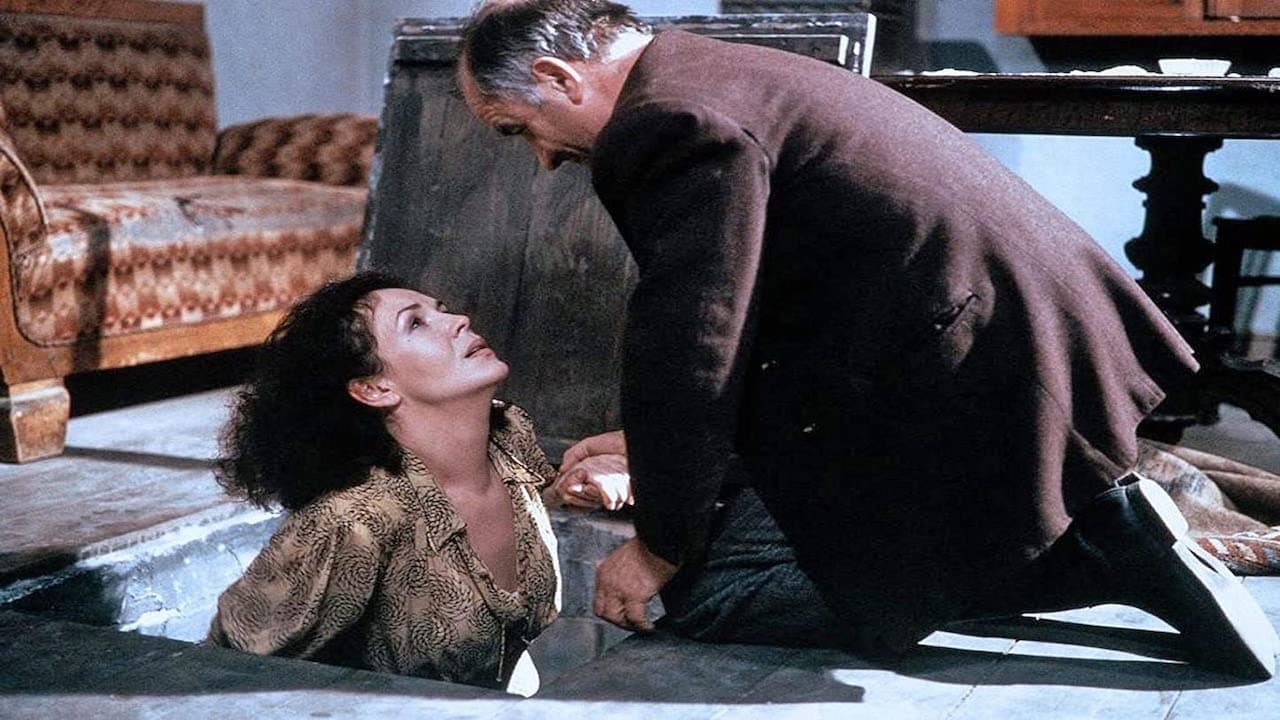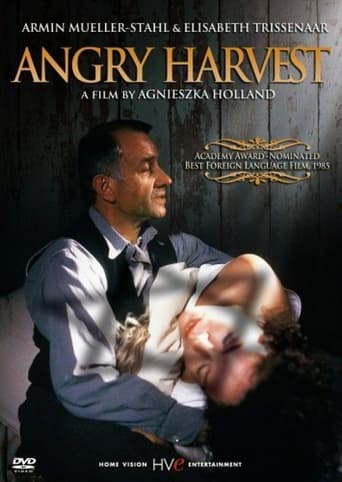



Very good movie overall, highly recommended. Most of the negative reviews don't have any merit and are all pollitically based. Give this movie a chance at least, and it might give you a different perspective.
View MoreThis is a small, humorous movie in some ways, but it has a huge heart. What a nice experience.
View MoreThis movie feels like it was made purely to piss off people who want good shows
View MoreThere's a more than satisfactory amount of boom-boom in the movie's trim running time.
View More"Bitter Ernte" or "Angry Harvest" is a West German German-language movie that had its 30th anniversary last year and was written and directed by Polish filmmaker Agnieszka Holland. Just like her work "Hitlerjunge Salomon", this one has its focus on life during World War II, but not on the military actions or politicians from that time. Instead the story here is about a Jewish woman who manages to jump from a train that was supposed to get her to a concentration camp. The entire film (100 minutes approximately) is about the woman's life at a local farmer's shack. The man decides to take her into his house, but his motives are far from those of a good samaritan, especially as we know all along she is married and her husband may have succeeded with his flight too. Armin Mueller-Stahl plays the epitome of an anti-hero here and definitely deserved his German Film Award nomination. If lead actress Trissenaar does so too, I am not sure, but I guess the duo carried the film nicely because they are together in here in the majority of scenes.This film was nominated for an Academy Award, but lost to the Argentinean entry back then. It is another solid installment in the way Germany worked on dealing with the aftermath of World War II and for Mueller-Stahl and Holland, it is among their most important and most known works. Even if I was not entirely impressed by this film, I still liked the focus Holland put in here and also how she managed a strong balance between happy and unhappy moments throughout the entire film. The way people talk in these 1970s and 1980s film seems occasionally a bit weird by today's standards, but I guess we just have to cope with that. And maybe they really spoke like that back then. It's also not so bad that it destroys the viewing experience somehow. Trissenaar's character is somewhat interesting as she must be among the most miserable characters in film history. Fighting for survival, she makes a couple bad decisions in her sad situation that ultimately lead to tragedy. From that perspective, the character was a crucial addition in this film, but I still believe it was more due to Holland's writing than the actress giving a great performance. Anyway, I am okay with the Oscar nomination and also okay with the fact that it did not win as it is a good, but great movie, mostly carried by Mueller-Stahl. A good watch for everybody with an interest in Nazi Germany and what life was like back then. I recommend it.
View MoreIn the winter of 1942-43, a Jewish family leaps from a train going through Silesia. They are separated in the woods, and Leon, a local peasant who's now a farmer of some wealth, discovers the woman, Rosa, and hides her in his cellar.What makes this film memorable is how it approaches the World War II era differently from many other films. We have a Jewish family, but there is not really a focus on the Holocaust or even really on the Nazis. We know they are in the background, but not the focus.There is much that could be discussed about the primary relationship -- is it natural, is it forced? Is there maybe even a bit of Stockholm Syndrome going on there? Is the man a hero, a villain, both... or neither? Does he know what he does is wrong?
View MoreSome reflections on how badly this film has been served, stemming from my surprise I had never heard of it, when I was looking for the work of Agnieszka Holland. The DVD from CCC Filmkunst, 1984, bears only the English title "Angry Harvest," and no indication that it should be originally "Bittere Ernte," a Harvest not "angry," but "grievous," "spoilt" too like the apples dumped out so that sack can be used for a darker purpose. Or I suppose one could think of Julia Ward Howe's Divinity "trampling out the vintage where the grapes of wrath are stored," but it never has come to that. The perpetrators of great wrong sit comfortable. We know that the Holocaust cannot be represented in art forms. With the perpetrators too we would destroy the screen. That's why it's odd that Roger Ebert, listed among Critics of this film and usually so generous in his sympathy, should have condemned the movie for not showing enough devastation. The film does something else with Arendt's insight into "the banality of evil." After Sunday mass occupying German soldiers chat with local girls. Property can be acquired in a way that is "perfectly legal" once one knows it was expropriated from a Jew "who probably won't be back to claim it." And thus to Leo Wolny, who is such a nice man and will bring you potatoes if you are out and soothe your fever. This is something different from what the box calls "a compelling story of love and desire." It is about a man and his peers who are "bitterböse," "fiercely evil."
View MoreA lonely German farmer (Armin Mueller-Stahl) hides a lovely, upper-class, Jewish lady from the Nazis. He falls in love with her and avoids helping her to escape; he would rather keep her with him. He hides the signal, that the lady's husband had left to show that he is still alive; the farmer would prefer that the husband be dead. This fascinating and subtle character study, by director Agnieszka Holland, depicts a man, torn between his conscience and his love, in a situation that he is unable to cope with adequately. Mueller-Stahl's performance is superb and very touching.
View More